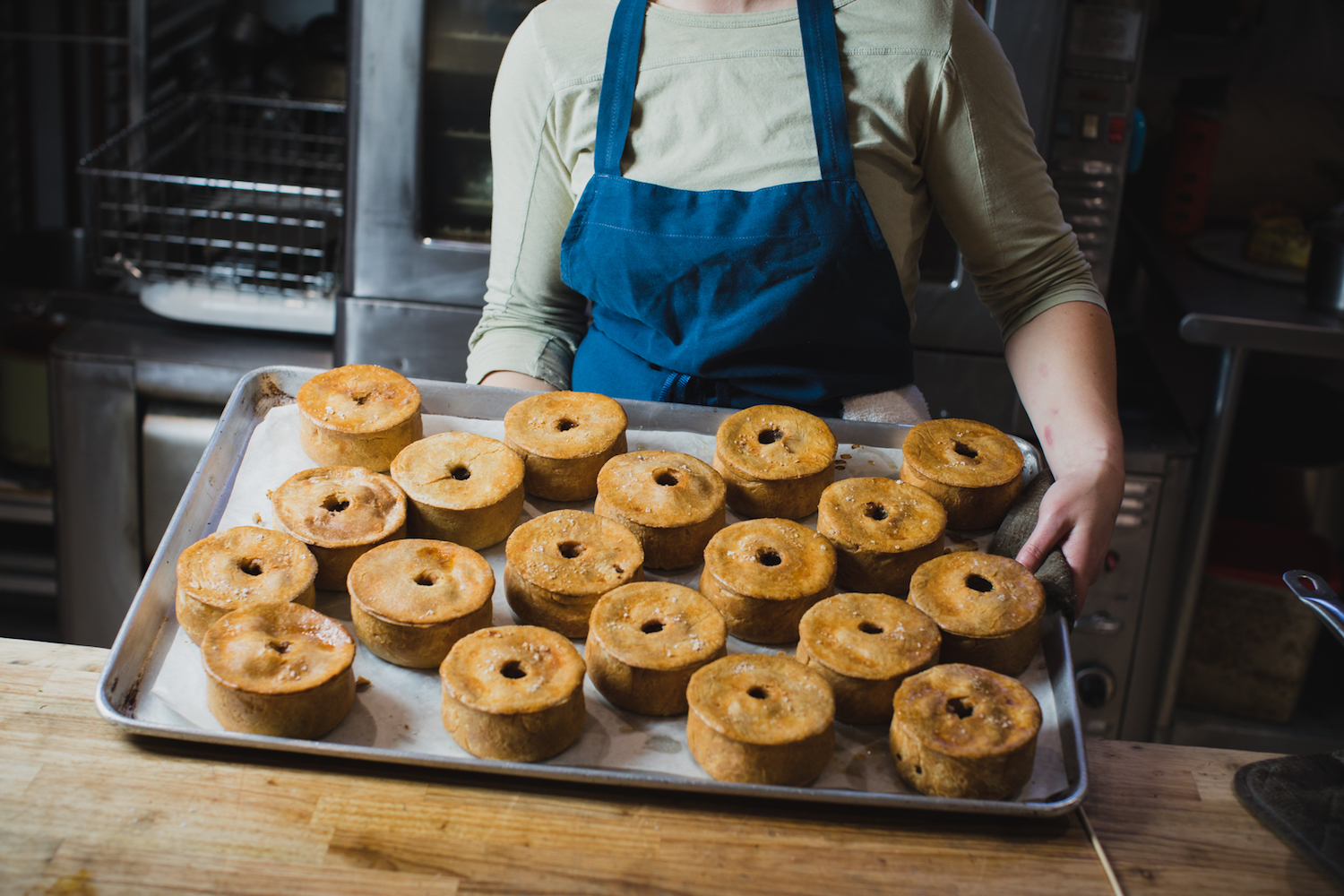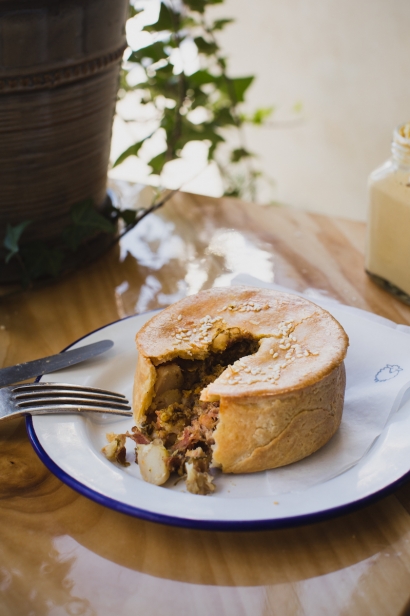Piecemeal Pies: Pastry Perfection
It takes three days to make a proper meat pie. Perfection cannot be rushed.
Justin Barrett has spent years developing and tweaking his British-inspired meat pies, and he can wax rhapsodic about the virtues of a hot water butter crust. “Because it’s not flaky, the crust holds together and doesn’t sog out with the filling.” And that little hole cut into the top crust of each pie? It’s not just for steam to escape. “After the pie has baked, I pour some of the braising liquid back in so the filling stays tender and moist.”
And these fillings would make any Brit proud. Rabbit and bacon, pork and parsnip, beef and mushroom, curried lamb and veggie, chicken and leek, smoked trout and fennel. Barrett also makes curried veggie pasties and another filled with potato, cheese and artichoke. On the sweet side, he and his bakers fill the front counter with seasonal fruit pies, proper scones (blueberry lavender, cherry cardamom, fig and anise, lemon ginger), lemon tart, chocolate beet brownies and legendary cinnamon buns.
All the meats and poultry come from Vermont farms, and seasonal veggies—organic greens, tomatoes, peppers, squash, beets, spinach— are grown in Vermont and New Hampshire. Ditto for the fruits and berries. Barrett orders the staples from a family-run White River operation, Sterns Quality Produce. “You’ll never see a Sysco truck here. My goal is to build strong personal relationships with farmers and smaller businesses right around here. This way, we support and benefit from each other.”
Piecemeal Pies has found its home in downtown White River Junction, in the former JJ Newberry department store. “White River Junction’s a real town, where grit mixes with the arts. We have the Center for Cartoon Studies and Northern Stage. There’s a young creative community here and the town is on the verge of a renaissance.”
A graduate of architecture school, Barrett designed the space and did most of the renovation himself. “I had to! I was on a shoestring budget and cut costs however I could.” He bypassed banks and secured funding from the Hartford Revolving Loan Fund and Community Capital of Vermont. “Their whole purpose is to help people create successful small businesses in Vermont.”
Barrett tore down the sheet rock and exposed the beautiful bricks that he then white-washed. A cast-iron prep sink and stools came from Vermont Salvage across the street; friends tracked down chairs that had done time at several other restaurants in the Upper Valley. Barrett built the communal table and counters along the wall from poplar heartwood, milled in Bethel to highlight the distinctive grain. The table legs? Sections of discarded street lamp posts that Barrett discovered in Burlington. And down in the basement, he found pine board stock-room shelves, which he sealed and used as flooring. Meals arrive on blue-banded white enamelware plates; mismatched antique sterling flatware adds to the vintage chic feel.
“Every element has a story, and that’s the concept behind Piecemeal. This business came together gradually over several years, in collaboration with people who brought their own stories and energies.
For starters, my meat pies wouldn’t exist if I hadn’t developed these relationships with all the growers who supply these amazing ingredients. Friends here in the Upper Valley showed me how to farm and slaughter animals. People all along the way believed in this enterprise and helped as they could.”
Barrett’s partner, Joshua Brown, pitches in with everything from construction and renovation to prepping and serving. “He basically keeps me sane.” Barrett praises his core team and notes, “Some of my best employees are also part-time farmers so they understand hard work and value quality ingredients.”
Piecemeal had originally been open seven days a week, but Barrett realized that pace was slowly crushing him. So rather than scale up and add more staff —and anxiety—he consolidated his business and now serves meals Friday, Saturday and Sunday. “Monday is a mandatory day of recovery, Tuesday is paperwork, Wednesday we drive around and pick up product from farms and markets and start prepping, and Thursday we’re in full production mode for the weekend. We also do some catering and wholesale baking for other accounts. We now look happier and feel healthier!”
In addition to “From the Farm” Fridays, with dishes inspired by their midweek farm trips, Piecemeal offers brunch from 10 to 3 on Saturday and Sunday. The spinach and bacon salad comes with thick slices of “fork and knife” lardon-style bacon, a perfectly poached egg, peppery radish slices and a tangle of meltingly soft pickled leeks. Duck-fat home fries, another signature dish, are hand-cut wedges of purple and gold heirloom potatoes, fried in duck fat till crisp with a creamy soft interior and sprinkled with minced fresh rosemary and thyme, flakes of crunchy sea salt, alongside a puddle of Dijon and shallot vinaigrette.
Then there’s buttermilk-brined fried rabbit with a shatteringly crunchy crust (goodbye chicken, hello rabbit!) and a stack of Belgian-style cheddar waffle quarters drizzled with chili-infused maple syrup. Corned beef hash includes new potatoes, beets and greens. Breakfast tacos arrive on housemade tortillas, with farm eggs, chorizo, queso and salsa roja. And you can satiate your sweet tooth with pecan buttermilk waffles topped with vanilla ricotta, peaches and bourbon maple syrup.
Barrett believes a well-crafted hard cider, which Vermont has aplenty, is the ideal beverage to complement his savory dishes. He offers a tasting flight with choices from Flag Hill, Farnum Hill, Shacksbury, Eden, Whetstone, Stowe and Citizen Cider. Beers come from River Roost a few blocks down the street and Upper Pass in South Royalton. “Mark at River Roost will hold our kegs in his walk-in and drop them off when we need them since we don’t have storage here.”
Kicking back one Sunday after the brunch crush, Barrett shared his backstory. After architecture school and a year in urban planning in Portland, Oregon, Barrett decided to scratch an intensifying itch. He landed a spot at a bakery and that led to a position at a Southeast Asian restaurant. “My professional cooking began with fi sh sauce and lime juice before salt and olive oil.” He did that for a few years and then hopped on a red-eye to Manhattan. “If I was serious about a food career, I wanted to learn from the best.” He set up stages at Momofuku and the Spotted Pig and gained invaluable training from April Bloomfield. He even cooked alongside the esteemed Fergus Henderson whenever the British icon came to the Spotted Pig. “I read his cookbooks like novels!”
Barrett moved to Strafford, Vermont, in 2010. He still wanted to cook but was developing his vision and broadening his experience. “Everybody raises food here, so I just learned by helping my friends.” That meant slaughtering sheep, processing chickens, nurturing a garden and using a chainsaw. In other words, learning how to farm, homestead style. “I would gather the less desirable parts after we slaughtered the sheep, the delicious bits like the caul fat, liver or kidney, and experiment with them at home. I still feel way more comfortable cooking rabbit liver than fi let mignon.”
These experiences helped him establish good relationships with area farmers. Now he calls them up weekly and will buy whatever they have. “When a dish is built on just three ingredients, you have to have the best quality. Meat pies are approachable, the antithesis of fancy. There’s a reason the Brits have prepared them this way for centuries—who am I to mess with that?”
Piecemeal Pies | @piecemeal_pies
Hartford Revolving Loan Fund and Community Capital of Vermont
Flag Hill Farm
Farnum Hill | @farnumhillcider
Shacksbury Cider | @shacksbury
Eden Cider | @edenciders
Whetstone CiderWorks
Stowe Cider | @stowecider
Citizen Cider | @citizencider
River Roost | @riverroostbrewery
Momofuku | @momfukunoodlebar
The Spotted Pig









